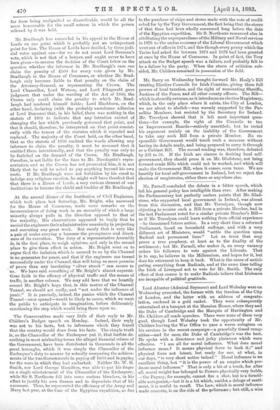Mr. Bradlaugh has succeeled in his appeal to the House
of Lords on one point which is probably not an unimportant point for him. The House of Lords have decided, by three judi- cial votes against one—for we do not count Lord Denman's vote, which is not that of a lawyer, and ought never to have been given—to reverse the decision of the Court below on the question whether the informer in Mr. Bradlaugh's case can claim the penalty of £500 for every vote given by Mr. Bradlaugh in the House of Commons, or whether Mr. Brad- laugh only becomes liable to that penalty on the claim of the Attorney-General, as representing the Crown. The Lord Chancellor, Lord Watson, and Lord Fitzgerald gave judgment that under the wording of the Act of 1866, the Crown only could claim the penalty to which Mr. Brad- laugh had rendered himself liable ; Lord Blackburn, on the other hand, declaring (with the probably unwelcome adhesion of Lord Denman) that, in his belief, there was nothing in the statute of 1866 to indicate that any intention existed of changing the law which previously governed that point, and that it should, therefore, be interpreted on that point consist- ently with the tenour of the statutes which it repealed and replaced. The majority of the Court held, on the other hand, that as the statute of 1866 omitted the words allowing any informer to claim the penalty, it must be assumed that it omitted them intentionally, and that the penalty was only to be forfeited on the demand of the Crown. Mr. Bradlaugh, therefore, is not liable for the fines to Mr. Newdegate's repre- sentative, and as the Crown has not prosecuted him, it is not likely that he will be asked to pay anything beyond his own costs. If Mr. Bradlaugh were not forbidden by his creed to indulge any religions emotion, he might well have thanked God that there is a House of Lords, a very curious element of our institutions to become the shield and buckler of Mr. Bradlaugh.


































 Previous page
Previous page